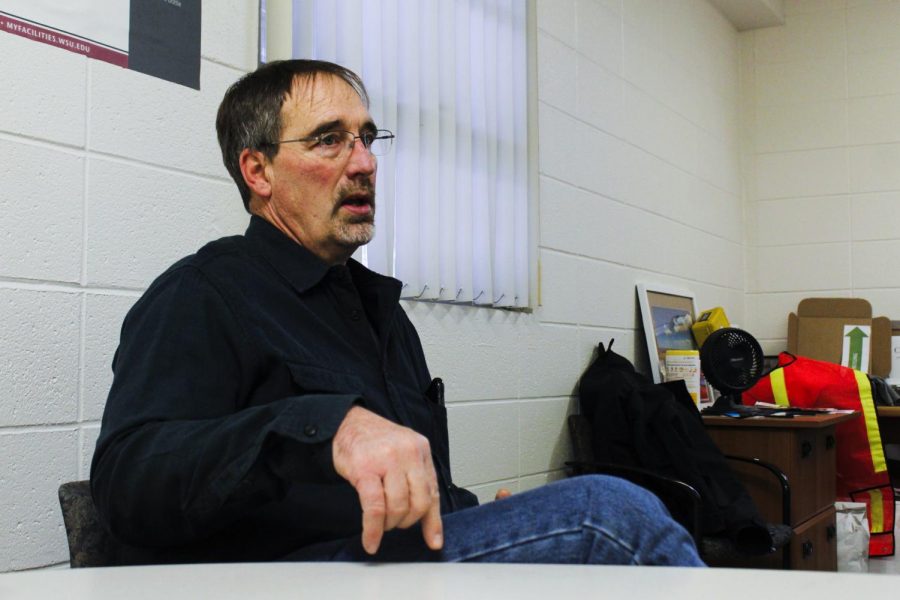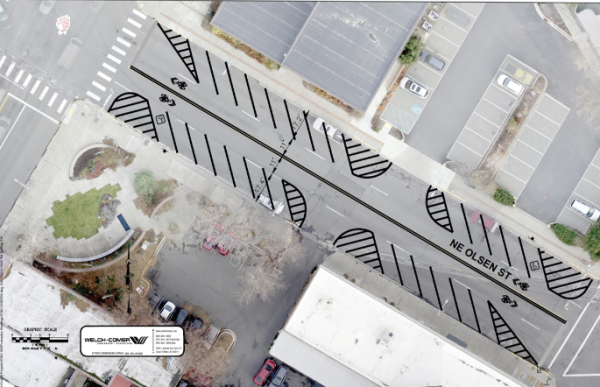Composting remains could take the place of burial, cremation for Washington residents
WSU leads pilot program based on previous research composting large animals
EUGENE LEE | THE DAILY EVERGREEN
Rick Finch, WSU facilities operations waste management manager, said he agrees with the decision to legalize the composting of cadavers to allow people to bury the dead.
January 28, 2019
Washington could become the first state to legalize the composting of human remains as an option after death.
Katrina Spade, founder and CEO of Recompose, a public benefit corporation, said she started the company to in the future offer recomposition, a process to convert human remains to soil. She wanted people to have another option instead of cremation, burial or donating their body to science.
“I was looking at the options we had for death here,” Spade said. “Really, all we have are burial and cremation. I thought there was no reason there shouldn’t be more options for us.”
She said people are interested in other burial paths. The Recompose mailing list has around 7,000 people worldwide.
The Washington State Legislative session held a hearing Jan. 15 regarding Senate bill 5001, which outlines the legalization of alternative ways to dispose of a human body. This includes recomposition.
Spade said the process of human recomposition is illegal in the U.S. because there are specific ways to dispose of a body.
At the hearing, Sen. Maureen Walsh (R-Walla Walla) asked where the compost from the human remains would go. Spade said the remains would be regulated the same way as ashes that come from cremation.
One of the concerns brought up at the hearing were the laws regarding scattering remains from cremation. Lisa Devereau, president of Washington State Funeral Directors Association, said those laws are “vague.”
Devereau said as long as the ashes are scattered on private property or if someone has a permit, there are few places where ashes cannot be scattered. She said there should be stricter laws regarding that.
Spade said it will still take months for the bill to be passed.
She said if the bill passed, Recompose will work with the Washington State Department of Licensing to regulate the facility. Spade said she would also have to raise money to open the facility.
Spade said the earliest the business could open would be in 2020.
She said a burial costs anywhere from $8,000 to $25,000 while cremation costs $1,000 to $7,000. Recompose is thinking of making its services $5,500, which includes time for a memorial service.
76.4 percent of Washington State’s residents are cremated, which is the highest rate nationwide, according to a press release.
Spade said she approached Lynne Carpenter-Boggs, WSU professor in the department of crop and soil sciences, around 2014. She said she had heard that Carpenter-Boggs was researching decomposition of livestock.
Spade said she wanted to know if humans could be composted too.
Carpenter-Boggs did a study that involved six donated human subjects. The research team recomposed the subjects over a period of weeks, Spade said.
They studied pathogen reduction and the rates of heavy metals present in the soil that was created from the recomposition process, she said. The rates of all the metals were lower than the United States Environmental Protection Agency limits.
Spade said the researchers determined that recomposition is safe and effective.
“Recomposition uses approximately one-eighth of the energy of cremation,” she said. “We’ve calculated just over a metric ton of carbon per person who chooses [recomposition over cremation or burial].”
She said the carbon footprint of burial is mainly due to transporting gravestones and caskets, as well as doing upkeep on the cemetery.
For cremation, the burning is the cause of the carbon footprint, Spade said.
Rick Finch, manager of WSU facilities services waste management, is the person in charge of Recompose pilot operations.
Finch said he has given advice to Recompose on composting, including possible equipment that could be used.
He said he has experience composting large animals because WSU composts them, many of which are larger than a human body.
“What we’re doing is we’re actually just kind of … speeding up the natural process of decomposition,” Finch said. “The environmental impact should be minimal.”
A large animal in a heap of compost mix is aerated, so bacteria will consume the material, generating heat which kills bad bacteria, Finch said.
In nature, this process can take longer than a year. WSU’s composting process occurs between 30 and 45 days, he said.
Finch said the material that is left is a beneficial soil amendment that adds nutrients to soil and can be sold to garden suppliers.
“The process, location and method of composting might be slightly different [for Recompose],” Finch said. “It’s not just about composting people. It’s about treating people in a dignified manner.”
For example, he said, people are not going to want to take their relatives to a commercial compost facility.
Spade said the body would be put in a container and covered with wood chips, straw and alfalfa. The container would be aerated and microbes would break down the body.
“I think it’s exciting, and I think it’s good that our state is on the forefront of this,” Finch said. “To me, it’s not a stretch. I’m pleased that there does not appear to be, initially, a lot of opposition to it.”
The story has been updated to reflect the correct name of the CEO of Recompose.
[googlepdf url=”https://dailyevergreen.com/wp-content/uploads/2019/01/Recompose-Press-Release-New-Sustainable-Death-Care-Option-Effective-Safe-Nov-2018.pdf”]





















